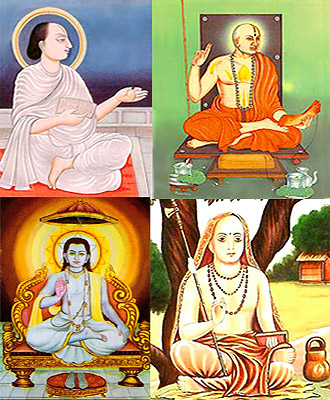 The schools of Vedanta are Advaita Vedanta, Vishishtadvaita, Dvaita, Dvaitadvaita and Shuddhadvaita. These were advocated by Adi Shankara, Ramanuja, Madhvacharya, Nimbarka and Vallabhacharya respectively.
The schools of Vedanta are Advaita Vedanta, Vishishtadvaita, Dvaita, Dvaitadvaita and Shuddhadvaita. These were advocated by Adi Shankara, Ramanuja, Madhvacharya, Nimbarka and Vallabhacharya respectively.
Advaita Vedanta
Advaita Vedanta Absolute Monism of Shankara or Advaita was advocated by Adi Shankara. It is the most influential sub-school of the Vedanta. According Advaita Vedanta, Brahman is the only reality and the world is illusory. There is no difference between the individual soul jivatman and Brahman.
Shankara maintains that there exists but One Reality as Brahman whose nature is pure Consciousness. Shankara discusses the question of reality of individual soul, this world, and Ishvara from this point of view and labels them as illusory. Final Liberation comes when this knowledge of unity of individual soul and eternal Soul is established through meditation and Samadhi.
Visistadvaita
Visistadvaita Theory was propagated by Ramanuja. According to this philosophy jivatman is a part of Brahman. In Vishishtadvaita, the Brahman has attributes including the individual conscious souls and matter. This school advocates Bhakti or devotion to God visualized as Vishnu to be the path to liberation. The creative power of God is Maya.
This is a philosophy of religion; and therefore it gives a synthetic view of the spiritual experiences of God or Brahman. It affirms the Upanishad truth by realizing Brahman everything else is realized. Heavily depending upon theory of Karma, this philosophy applies the law of cause and effect to moral experiences.
Dvaita
Dvaita philosophy was advocated by Madhvacharya. It is also known as tatvavada. This philosophy identifies God with Brahman. Brahman, all individual souls and matter are regarded as eternal and mutually separate entities. It also propagates Bhakti as the route to sattvic liberation. Liberation is the state of attaining maximum joy. It is also believed that all action is performed by the Lord energizing every soul from within
Dvaitadvaita
Dvaitadvaita was propagated by Nimbarka. It was based upon an earlier school known as Bhedabheda, which was taught by Bhaskara. The jivatman is the same yet different from Brahman. The jiva may be regarded as dvaita from one point of view and Advaita from another. God is visualized as Lord Krishna.
Shuddhadvaita
Shuddhadvaita was advocated by Vallabhacharya. According to this system Bhakti is the only means of liberation. The world is considered to be the sport of Krishna. Shuddhadvaita is the "purely non-dual" philosophy. This tradition originated near Vrindavan. However in modern times followers of Shuddhadvaita are concentrated in the states of Rajasthan and Gujarat.



















